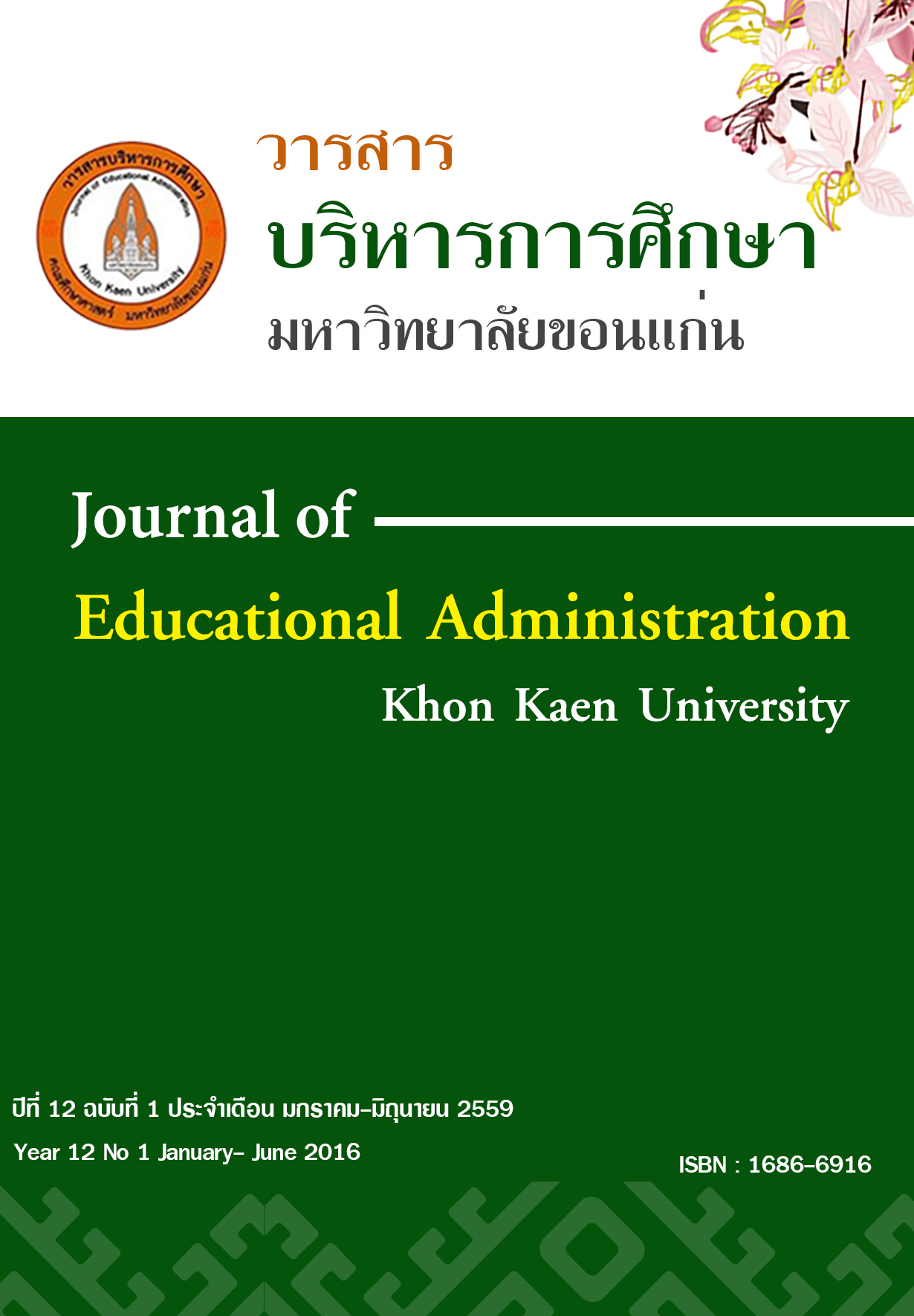การพัฒนาความสามารถในการจัดการเรียนรู้ในศตวรรษที่ 21 ของครูในโรงเรียนขยายโอกาสทางการศึกษา A DEVELOPMENT IN LEARNING MANAGEMENT CAPABILITY IN THE 21st CENTURY FOR THE TEACHERS IN THE EDUCATIONAL OPPORTUNITY EXPANSION SCHOOLS
Main Article Content
บทคัดย่อ
การวิจัยครั้งนี้มีวัตถุประสงค์ เพื่อสร้างแผนการพัฒนา และศึกษาประสิทธิภาพของการใช้แผน
การพัฒนาความสามารถในการจัดการเรียนรู้ในศตวรรษที่ 21 ของครูในโรงเรียนขยายโอกาสทางการศึกษา
โดยการดำเนินวิจัย มี 4 ขั้นตอน ดังนี้ 1) การศึกษา และวิเคราะห์ ข้อมูลพื้นฐาน 2) การสร้างโครงร่างแผน
การพัฒนาครู 3) การตรวจสอบประสิทธิภาพการใช้แผนการพัฒนาครู 4) การปรับปรุงแผนการพัฒนาครู ประชากรเป้าหมาย คือครูระดับชั้นมัธยมศึกษาตอนต้นในโรงเรียนขยายโอกาสทางการศึกษา สำนักงานเขตพื้นที่การศึกษาประถมศึกษานครราชสีมา เขต 1-7 ในปีการศึกษา 2557 จำนวน 30 คน ได้จากการเลือกแบบเจาะจง เครื่องมือที่ใช้เป็นแบบวัดความรู้ วัดความสามารถในการออกแบบการจัดการเรียนรู้ และวัดความพึงพอใจที่มีต่อการใช้แผนการพัฒนาครู วิเคราะห์ข้อมูลโดยใช้โปรแกรมสำเร็จรูปทางสถิติ เพื่อหาค่าเฉลี่ย ร้อยละ ส่วนเบี่ยงเบนมาตรฐาน และการทดสอบค่าที ผลการวิจัยพบว่า
1. แผนการพัฒนาความสามารถครู มีลักษณะที่ประกอบด้วย 2 ส่วน ส่วนแรกเป็นองค์ประกอบ
ของแผนการพัฒนาครู มีดังนี้ 1) หลักการและเหตุผล 2) วัตถุประสงค์ของการฝึกอบรม 3) ระยะเวลาของการฝึกอบรม 4) โครงสร้างของแผนการฝึกอบรม 5) วิธีการฝึกอบรม 6) สื่อและอุปกรณ์ในการฝึกอบรม
7) การวัดและประเมินผล ส่วนที่ 2 เป็นแผนการฝึกอบรมมี 6 แผน ได้แก่ มุ่งหน้าสู่การจัดการเรียนรู้
ในศตวรรษที่ 21 ทำไมต้องสอนเน้นคิด คิดไตร่ตรองทดลองปัญญา สะดุดปัญหาต้องแก้ให้เป็น ยุทธวิธี
แห่งการเรียนรู้ในศตวรรษที่ 21 ร่วมสรุปและประเมินผลการพัฒนา รวมใช้เวลา 32 ชั่วโมง
2. ผลการศึกษาประสิทธิภาพของการใช้แผนการพัฒนาความสามารถของครูสรุปได้ ดังนี้ 1) ครูมีความรู้ความเข้าใจหลังการฝึกอบรมสูงกว่าก่อนการฝึกอบรมอย่างมีนัยสำคัญทางสถิติที่ระดับ.01 คิดเป็น
ร้อยละ 84.78 2) ครูสามารถออกแบบการจัดการเรียนรู้ในศตวรรษที่ 21 ด้วยกระบวนการที่เน้นการคิด
แก้ปัญหาอย่างมี วิจารณญาณ โดยภาพรวมอยู่ในระดับมาก ( = 4.55, S.D. = 0.19) และ 3) ครูมี
ความพึงพอใจต่อการใช้แผนการพัฒนาความสามารถในการจัดการเรียนรู้ในศตวรรษที่ 21 โดยภาพรวม
อยู่ในระดับมาก ( = 4.45, S.D. = 0.52)
The purposes of this research were to create teachers’learning management capability in the 21st century, and to study the efficacy of development plan in learning management in the 21st century for teachers in the educational opportunity expansion schools. The research and development procedure consisted of 4 steps: 1) analyzing and synthesizing fundamental information, 2) creating professional development plans (PD plans) for teachers, 3) gathering and organizing data, 4) revising the PD plans. The expected participants were 30 teachers who were teaching secondary schools in the educational opportunity expansion school in Nakhon Ratchasima Educational Area 1-7, in the year 2014. They were selected using purposive sampling technique. Three research instruments used in this study were the test on knowledge of the instructional management in the 21st century, the test on the instructional design appropriate for students’ learning in the 21th century, and the satisfactory questionnaire based on their professional development participation. The percentage, means, standard deviation and the dependent t-test were used for the data analysis.
The results of this study were as follows:
- The Development in Learning Management in the 21st for the teachers in the educational opportunity expansion schools. The characteristics include two parts. First section was composed of 7 components; namely,1) the rational, 2) the objectives, 3) the numbers of hours, 4) the framework of PD plans, 5) the procedure, 6) the instructional aids, 7) and the assessment. Part two, divided the 6 PD plans. There were: aimed at the participants being knowledgeable in their instructional management
in the 21st century; emphasized why it was necessary for students’ exercising their thinking; focused on critical thinking; was problem-solving; aimed at essential learning strategies in the 21st century ; joint summarized and evaluate the development. Within 32 hours.
2. The teachers’ outcomes at the end of the PD training could be summarized as follows: 1) The participants’ knowledge regarding learning management in the 21st century after they were trained was significantly higher than before training at the level of .01 (84.78%). 2) The participants’ overall capability in their instructional design integrating the critical problem-solving was evaluated as high ( = 4.55, S.D.= 0.19). 3) The participants’ satisfaction towards their PD training as a whole was rated as high ( = 4.45, S.D. = 0.52).


